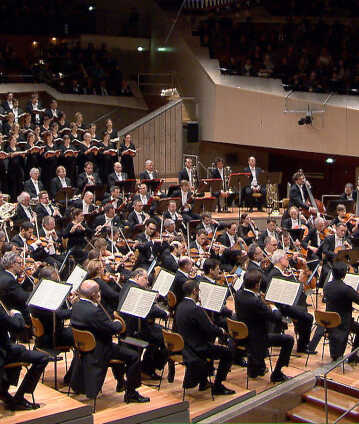Marek Janowski conducts Verdi’s Requiem

Verdi’s Requiem is unique in musical history. As in his great stage works, the Italian operatic composer wanted to convey profound emotions rather than spiritual transcendence. In this concert from 2017, we hear the Berliner Philharmoniker together with the Berliner Rundfunkchor. The conductor was Marek Janowski, who returned to the orchestra after an absence of more than 20 years.
Standing in for an indisposed Riccardo Chailly who was originally to conduct these concerts, Marek Janowski returns after an absence of more than 20 years to the conductor’s desk of the Berliner Philharmoniker – with Giuseppe Verdi’s both monumental and emotional Messa da Requiem, a work he has already performed at the Philharmonie with the Rundfunk-Sinfonieorchester Berlin in 2015. The performance by Janowski, then still head of the Rundfunk-Sinfonieorchester, was – according to the Tagesspiegel – far from a sentimental tearjerker.
The initial impetus behind Verdi’s famous Requiem was a pasticcio commemorating the death of Gioacchino Rossini: the idea was that the most prestigious Italian composers would jointly compose a requiem without any fees. The project, in which Verdi participated with the Libera me, failed. When the writer Alessandro Manzoni died on 22 May 1873, he decided to honour the most important figure of Italian literary Romanticism by setting the entire mass to music, making use of the movement already composed. It is perhaps hardly surprising for an opera composer like Verdi that the Dies irae is accorded the greatest significance in this requiem: no other line of text is brought to mind so often, with such emphasis and in so many musical hues, as in this apocalyptic vision, whose scenery takes on almost expressionist traits – of the Earth shaking, of the trembling of all mortals, and of the final judgement reinforced by trombones.
The operatic field is truly reached at the latest in the Lacrimosa, because the piece is based on a discarded duet from Don Carlo (the thunderstorm scene from Rigoletto is heard before that). As in his stage works, Verdi also developed in his Requiem a compelling tonal language rich in gesture that does not aspire to transcendence. For that reason, the Italian music critic and journalist Massimo Mila called the piece a “Requiem ante mortem”: its music does not seek any reconciliation with death or intend to offer solace, but instead calls for a more conscious life in the here and now.
© 2017 Berlin Phil Media GmbH
Related interviews